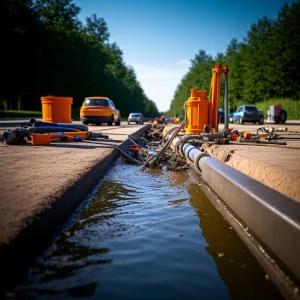Recent cuts to U.S. funding, especially from PEPFAR, are causing serious trouble for South Africa’s fight against HIV. Many health facilities have closed, and thousands of crucial healthcare workers have been let go, leading to fewer tests and treatments for people living with HIV. Vulnerable groups, like sex workers and the LGBTQ community, are at risk of losing the specialized care they need due to the shutdown of welcoming centers. Without immediate action, these funding cuts could lead to a steep rise in HIVrelated deaths, leaving many without the support they desperately require.
South Africa is carefully managing its relationship with the United States, focusing on respect and independence. The African National Congress (ANC) wants to show that they won’t be bullied, using established diplomatic channels instead of special delegations. They believe in maintaining dignity on the world stage, drawing from their rich history of fighting for autonomy. By sticking to their own diplomatic structures, South Africa aims to stand strong while still engaging with other countries. This strategy highlights their commitment to sovereignty and respectful dialogue in a complex global landscape.
Cape Town is a sweet paradise for dessert lovers, bursting with tasty treats to try! At Unframed Ice Cream, you can enjoy fun and creative flavors like vegan chocolate. Jason Bakery serves the famous ‘doughssants’ that everyone loves, while The Ice Café brings back memories with its retro ice cream flavors. For a classic soft serve, head to The Dairy Den. Don’t miss the whimsical cupcakes at Charly’s Bakery or the handmade chocolate at Honest Chocolate. Each spot is a delicious adventure waiting for you!
In Cape Town, Uturn Homeless Ministries and The Hope Exchange have joined forces to fight homelessness. This exciting partnership, called ‘The Hope Exchange operated by Uturn,’ combines their strengths to support those in need more effectively. By merging Uturn’s innovative recovery programs with The Hope Exchange’s longstanding services, they aim to provide better living conditions and pathways for the homeless. Together, they are shining a bright light of hope, helping people rebuild their lives and reconnect with their communities.
Diplomatic Dissonance: Ebrahim Rasool and the Shifting Sands of US-South Africa Relations
Ebrahim Rasool, South Africa’s ambassador to the U.S., stirred up a storm when he critiqued American politics, leading to tensions with the U.S. government. His speech compared U.S. foreign policy to a telescope, suggesting that countries should align their actions with their values. U.S. Secretary of State Marco Rubio called Rasool ‘persona non grata,’ accusing him of racebaiting after he mentioned changing demographics in America. This sparked a heated debate about the connection between race and politics, showing how deeply personal and national identities can affect international relations. Rasool’s words highlighted the need for calm and thoughtful engagement, urging South Africa to navigate these diplomatic challenges wisely.
Cape Town’s Sky Circle project is an exciting new plan to improve how people move around the city. By building a raised traffic circle, it will connect different neighborhoods better and make the MyCiTi bus service more efficient. While construction starts this weekend, with some temporary road changes, the city hopes that the longterm benefits will be worth it. This project is not just about roads—it symbolizes Cape Town’s vision for a greener and more connected future, ensuring that everyone can travel easily and sustainably.
South Africa is working hard to strengthen its friendship with the United States. President Ramaphosa is focused on improving trade, political talks, and cultural exchanges to build better ties. By sending key ministers to meet with US officials and appointing experienced diplomats like Ebrahim Rasool as ambassador, South Africa aims to clear up misunderstandings and promote cooperation. Despite some challenges, Ramaphosa is determined to keep the dialogue open, ensuring both countries can work together for a brighter future.
In South Africa, a heated debate is brewing over fair representation in jobs, sparked by Minister Gayton McKenzie’s job ad that favored certain racial groups. Many critics argue that this approach sidelines black candidates, while McKenzie defends his choices by highlighting the need for diverse representation in a country still healing from apartheid. His stance aims to correct past wrongs by ensuring that all races have a voice in government jobs. This struggle for balance between equity and merit showcases South Africa’s ongoing journey towards a truly inclusive society, where discussions about race and fairness remain vital for its future.
Cape Town is a treasure for matcha lovers, showcasing three amazing spots to enjoy this vibrant green tea. At Mochi Mochi in Heritage Square, you can savor authentic Japanese matcha and tasty treats like matcha mochi ice cream. How’s Your Oni? in Green Point specializes in elegant matcha lattes that are both simple and delicious, making it a perfect cozy retreat. Finally, Nice to Matcha in Sea Point offers fun and creative drinks that make each visit exciting and fresh. These cafés not only serve matcha but also share a piece of Japanese culture, turning tea time into a delightful adventure!
South Africa’s Competition Commission has ordered Google to put aside between R300 million and R500 million each year to support local news media. This decision comes after a report revealed that while Google makes a huge profit from South African news, local publishers are struggling financially. The commission also wants tech giants like Meta and YouTube to change their practices, making it easier for South African stories to be seen and heard. This move aims to ensure that local voices are not lost in the sea of global media, helping to keep journalism alive and vibrant in the country.
In postapartheid South Africa, the fight for equality faces many tough challenges. Thuli Madonsela, a strong voice for justice, criticizes AfriForum for resisting the changes needed to treat everyone equally, especially after the unfair advantages of the past. She believes that true equality means everyone must be treated the same, pushing against old privileges. Moreover, AfriForum’s actions, like seeking support from international figures, complicate the journey towards fairness and unity in South Africa. As the nation works to heal its wounds from apartheid, embracing inclusivity and acknowledging history is vital for a brighter future.
CrystalDonna Roberts was a shining star in South Africa’s film and television world, known for her powerful performances and warm spirit. She bravely fought cancer while lighting up the screen in films like *Krotoa*, earning awards and the love of many fans. Beyond acting, she deeply cared for her community, helping others and inspiring young people. Though she left us too soon at just 40, her legacy of strength, talent, and kindness will continue to inspire for years to come.
Naturalized citizens are facing tough times trying to get the 2025 SA Smart ID Card. They struggle with slow computer systems, hardtoreach old ID booklets, and long waits at home affairs offices. Many feel left out and frustrated as they are turned away without help. Although there’s hope for better technology and new features in the ID cards, the process is still a long and rocky road for those seeking to feel truly at home in South Africa.
Cape Town is gearing up for some water supply disruptions in neighborhoods like Sir Lowry’s Pass Village and Airport Industria on March 4. These interruptions are important for upgrading the water system, so residents should store water and keep taps closed to avoid any issues. Although the work might be a bit inconvenient, it’s necessary for a stronger, more reliable water supply in the future. The city encourages everyone to prepare and stay informed about the changes to manage the temporary challenges. Ultimately, these efforts will help ensure Cape Town remains a thriving place for everyone!
Gene and Betsy Hackman were found dead in their New Mexico home under sad and mysterious circumstances. Gene, a celebrated actor at 94, died from heart disease and Alzheimer’s, while 65yearold Betsy tragically fell victim to a rare virus. Their bodies were discovered after a worried maintenance worker noticed something was wrong, revealing a scene filled with sorrow and confusion. The couple’s private life and sudden deaths paint a haunting picture, leaving behind a legacy of remarkable films and an air of enigmatic sadness. As we remember Gene, his powerful performances and the unique stories he told will continue to inspire audiences everywhere.
Nestled in the lively Little Mowbray area of Cape Town, NOVO pizzeria shines as a culinary star! Famous for its delicious Fellini pizza, made with topnotch ingredients like fennel sausage and creamy mozzarella, NOVO has quickly won hearts and earned a spot as one of the best pizzerias in the world. With a focus on quality and tradition, each pizza tells a story of care and passion. This familyowned gem not only delights locals but also invites food lovers from around the globe to savor its mouthwatering creations. As NOVO continues to rise, it promises to share even more flavorful adventures!
















